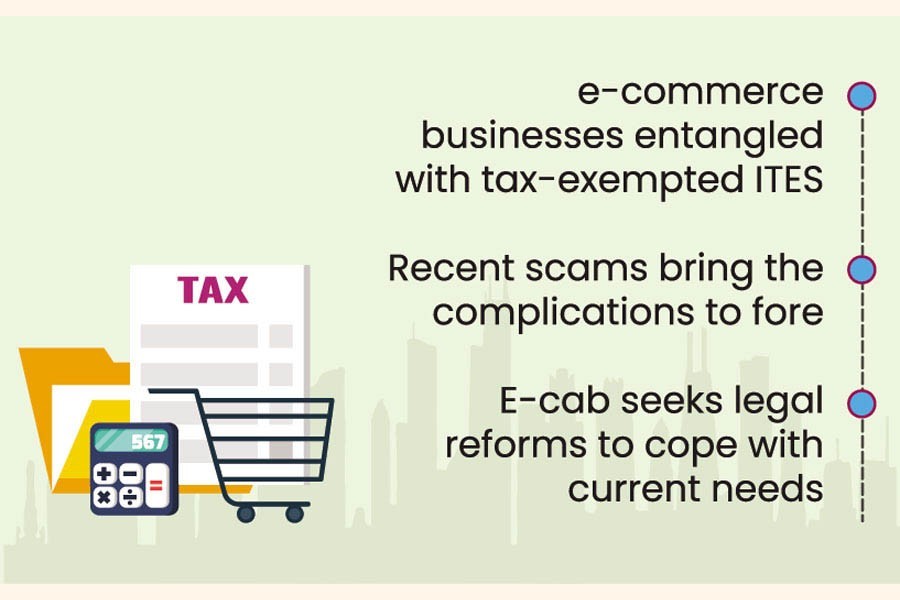Fastest-growing e-commerce left rudderless, taxmen in a quandary over taxing virtual trade

Published :
Updated :

The fastest-growing e-commerce that has been carrying out trade transactions worth billions is yet to get government recognition as a business category, sources say.
The e-commerce businesses do not exist in the listed categories of company registration, trade-licence application, or tax registration with a tax identification number (TIN) under the relevant authorities.
It's like a double bind as taxmen get into difficulties to scrutinise their compliance with tax laws while the upstart entrepreneurs face problems in doing business and availing legitimate benefits.
The Company Law 1994, the Trade Licence Act 2016 and the Income Tax Ordinance 1984 are yet to recognise e-commerce business as a separate category although more than two decades have gone by since the start of e-commerce businesses in Bangladesh, concomitant with the flourishing of information communications technology.
New-generation entrepreneurs started off e-commerce ventures in Bangladesh in 1999 and flourished as professional businesses up until 2009.
However, the e-commerce businesses got a shot in the arm in 2020 for the Covid-induced lockdowns that caged people home and disrupted supply chains here and the world over like during a holocaust.
The Registrar of Joint Stock Companies and Firms (RJSC), City Corporations, and the National Board of Revenue (NBR) have yet to incorporate a category under which e-commerce businesses could get registered as separate businesses.
Currently, the country's e-commerce businesses are taking a detour, obtaining registration as ITES (information technology-enabled services).
ITES is exempt from payment of taxes until 2024 while e-commerce businesses are taxable.
Obtaining TIN and submission of returns are mandatory for e-commerce businesses so that government can monitor their financial activity.
Following a slew of recent allegations surrounding several e-commerce businesses, the tax authority found it difficult to identify the e-businesses by sorting them out from the ITES.
Businesses-insiders say they are also facing problems for not having an identity in company registration, trade licensing or tax registration.
Following recent instructions from NBR chairman Abu Hena Md Rahmatul Muneem, the tax authority moved to monitor the business operations of e-commerce in Bangladesh.
Talking to the FE on Tuesday, the NBR chairman said they would look into the issue and take necessary steps to incorporate e-commerce as a category in e-TIN registration.
Mr Muneem pointed out certain shortcomings in tax laws on this score. "The income-tax law drafted in 1922 has been implemented since 1984 without significant changes," he said.
So far, the tax authority has found more than 200 companies in this business, out of 1600 businesses across the country.
Although e-commerce businesses are currently scattered under many tax offices, initially taxmen found some two dozen companies submitting tax returns annually, NBR officials said.
E-cab (association of ecommerce businesses) general manager Jahangir Alam Shovon said the e-commerce businesses have to face questions coming from different government agencies over obtaining of registration as ITES.
"In case of dispute arising over payment of tax VAT or loan approval or category of investment, the e-commerce businesses face problems due to inconsistencies for this," he added.
The government has yet to recognise e-commerce as separate business, he said.
"We have proposed to amend the Trade Licence Act to allow e-commerce businesses for obtaining licence separately," he said.
A meeting was held in February 2020 in this regard in local government department on this proposal, but it was yet to proceed further, he added.
He said currently three to four per cent of the e-commerce businesses have formed companies but all have TIN either as company or individual as tax registration is mandatory for obtaining membership of the association.
"None of the e-commerce businesses saw profit so far. It's not our duty to verify whether they are submitting tax returns or not," he added.
The E-cab had three meetings with the NBR on VAT issues and handed over lists of the members to the tax authority, he said. Already, taxmen have started visiting different ecommerce offices to check their operations.
"Most activities of e-commerce companies are exempt from tax-VAT and majority of them are small entrepreneurs," he added.
The association leaders have requested taxmen not to harass the e-commerce businesses which are not eligible to pay taxes, he added.
The association assured of extending all-out cooperation to tax authority in collecting tax from those supposed to pay tax.
"We arranged seminar and workshop to make members aware on payment of taxes," he said.
General Secretary of e-Cab Md Abdul Wahed Tomal said e-commerce is not defined as separate business in the trade-licensing law, causing difficulties to track businesses operating in informal sector.
"We could not pass the government-offered benefits to the small ecommerce entrepreneurs as 80 per cent of the online businesses are being operated from residence," he added.
Most are obtaining registration as ITES while others under the names of their existing businesses, if they have, he added.
In an internal survey last year, the tax authority found some 650 e-commerce businesses. Of them, more than 200 are companies while the rest are non-companies.
There is 5.0 per cent VAT on service value of e-commerce businesses.
Association sources said daily deliveries of the businesses are 0.2 million with only one per cent large companies, 4.0 per cent medium-scale and 95 percent small businesses.
Only 4.0 per cent of the country's population buys online.
Despite several attempts, the registrar of RJSC and city corporation trade-licensing authority couldn't be reached for their comment.
doulot_akter@yahoo.com


 For all latest news, follow The Financial Express Google News channel.
For all latest news, follow The Financial Express Google News channel.